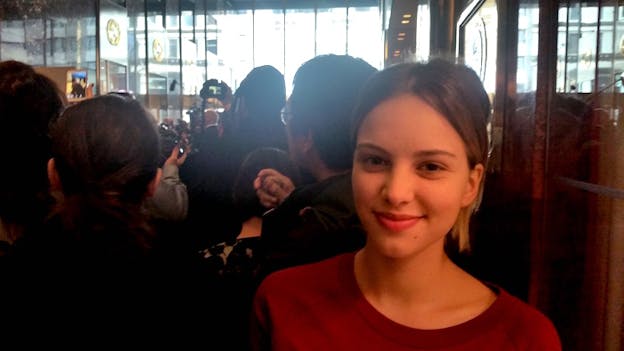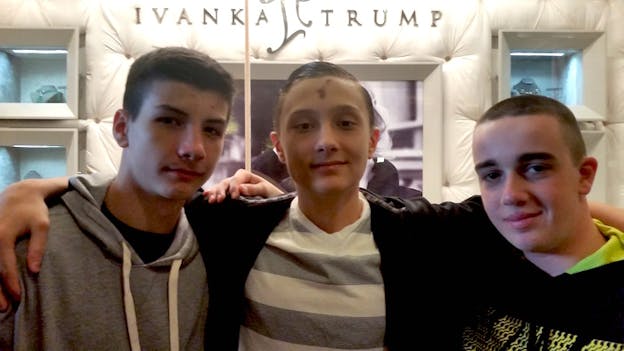When Donald Trump was signing copies of his new book, Crippled America, at—where else?—Trump Tower in Manhattan on Tuesday, there was a strong showing by an unexpected constituency: the teens.
That a 69-year-old Republican presidential candidate would appeal to teenagers was surprising, and initial interviews only caused more confusion. “I think he’s really nice,” Joe Martin, a tween, said, swamped in an oversized Trump T-shirt and carrying five copies of Crippled America. Martin was delicately asked why he thought Trump was nice, given that the candidate insults every single entity that dares to cross him in the most vulgar manner, and Martin responded that Trump was not only nice, but also that he was friends with nice people and would appoint nice people to help manage America.
Clarification came only when his father approached and proudly said his son was a football fan but that he preferred to watch the Republican primary debates, as his son beamed behind him. Martin's father, wearing a Miami Dolphins sweatshirt, was clearly the catalyst for his son's interest in politics. Particularly enamored with Trump's economic policies, the elder Martin also indicated that he supported Ross Perot Jr. in the 1990s and that "the country needs a third party."
Embedded in the unsettling rise in Donald Trump’s popularity, which has been largely based on swelling anti-immigrant outrage, is a heartwarming story about the American family. The kids like Trump because their parents do.
Trump benefited from high teen turnout partially because it’s Election Day, so New York City schools are closed. None of the kids had chosen Trump as the marquee event in a Ferris Beuler-style day of skipping school. Some of them were just hanging out in the city for the day, and happened to hear Trump would be giving a speech.

Abigail Brooks, 16, said, “I love Donald Trump! I think he could totally be the next president. … He’s the only one who says it like it is.” What kind of issues does he address that no other politician would? “Uh, Rand Paul’s hair?” Brooks said, laughing. She was there with her mom, who did not want any part of the interview, but who was closely monitoring Trump's progress from one end of Trump Tower to the other. Brooks said Trump would talk about “illegal immigration issues” that other candidates ignored. “I think his FedEx tracking system idea is hilarious. And it could work.” (It was actually Chris Christie, the governor of New Jersey, who suggested hiring FedEx founder Fred Smith to set up an immigrant tracker.) But is Trump anti-woman? “I think he loves women,” Brooks said. “I mean he criticizes men all the time, so who cares if he criticizes a woman? He criticizes everyone.”
In New York City, eccentricity is always around the corner, and during this portion of Brooks’s interview, a middle-aged man who would only give his first name, Ho, interjected that Trump could not possibly hate women, because New York women are the most conceited women in the world, and they love Trump.

A trio of 14-year-old boys from Long Island had been walking around the city on their day off, and while one said, “My dad doesn’t know I’m here,” all three indicated their families were pro-Trump. Their analysis of the campaign was fairly simple. Trump is smart because he’s rich, and he’s rich because he’s smart—when we asked why they support Trump one simply said, "He's a billionaire, bro." Most of our conversation revolved around Trump's wealth and business acumen, but one of the boys, Daniel, indicated support for one non-economic policy: immigration. "The whole thing with immigrants getting kicked out or whatever: It's the truth. If you're legal, you're legal, but if you're not, get out."
But for all three, immigration was secondary to Trump's wealth. Asked what single issue drew them to Trump, Daniel said "getting us money," as the other two laughed and nodded. Because Trump is rich, President Trump will make all of us rich? "Well, not rich," Daniel said. "But he'll make taxes lower, make the economy better."
Eddie Sacco, 19, of Maspeth, Queens, was the oldest teen we talked to. He was also there by coincidence—he passed by the book-signing as he walked toward the train from nearby John Jay College, where he studies criminology. Sacco was adamant that he had closely examined the other candidates’ policies, telling us, “I like to look at everyone’s views, I don’t like to just support someone for no reason.” Trump, he said, “has almost every view that I’ve had for a while.” Sacco was particularly attracted to Trump’s policies on illegal immigration, saying, “Deportation—I think it’s the best option. We’d be saving a lot of money in the long run, because it costs us a lot of money. … If you go down south to Texas and California, there is tremendous crime. I know people from Texas, and they say that drug trafficking is insane over there. [Illegal immigrants] come over to work, but once they realize how easy it is to cross the border they just want to do drug-trafficking.”
While Sacco also praised Trump’s tax plan—particularly raising taxes on hedge-fund managers and lowering taxes for people making less than $25,000 a year—he seemed to be particularly attracted to the law-and-order aspects of Trump’s platform, telling us that gun control “only works for the criminals, so I like his position on the Second Amendment.” After graduation, Sacco plans to enter law enforcement or become a lawyer—regardless of which path he chooses he told us that, like Trump, he plans on opening several businesses.
For Sacco, too, supporting Trump is also a family affair. Asked if his parents support Trump, Sacco laughed and said, “They all do. My parents. My grandparents, too. Actually my grandma on my mom’s side—she’s for Hillary Clinton. But she doesn’t really know much about it.”
Of the teens we spoke to, Sacco was something of an outlier—the only one who seemed to support Trump for his policies, instead of his wealth or persona. But for all of these teens, supporting Trump is a family affair, something that clearly comes from the top down. None of the teens we spoke to seemed to be supporting Trump to piss off their parents. Far from it. Instead, rooting for Trump, even if they wouldn't be able to vote in next year's presidential election, was a way for them to connect with their parents, to share something with them, or, perhaps, to gain their approval.
It's no accident that Joe Martin's dad was so proud of his son for watching a Republican debate. Rooting for Trump, for these teens, is like rooting for your dad's favorite sports team—a way to connect, not to rebel.
